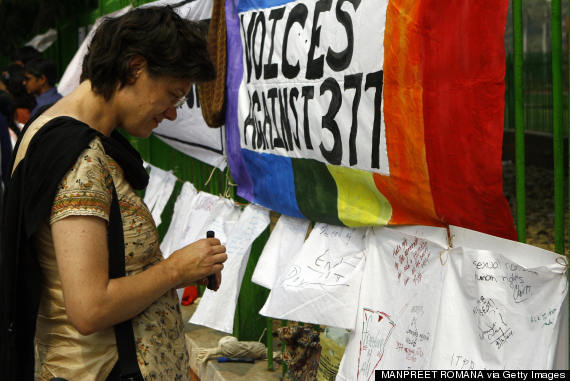
In July of 2009, the Delhi High Court "read down" Section 377, the 153-year old sodomy laws instituted by the British, making sex between two consenting adults, regardless of their gender, legal. This was a monumental victory for the LGBTQH (Lesbian, Gay, Bisexual, Transgender, Queer and Hijra) communities in India, and their struggle for equal rights. Indians living abroad like myself, who have been working to promote visibility and acceptance of sexual minorities in South Asian communities in diaspora, welcomed and cheered the news. We felt an incredible sense of pride in our nation, and its judicial system that privileged human dignity and equal rights over political campaigns based on religious bigotry, intolerance, policing public morality and using fear to drum up support. Now the nation's highest court is trying to make us into criminals -- again.
Four years after the landmark High Court judgment, this week the Indian Supreme Court decided against equality, setting aside the Delhi High Court's verdict, and leaving the issue to be debated in the Indian Parliament. Given the increasingly polarizing political climate in the country, leading up to next year's parliamentary elections in May, the likelihood of the Parliament taking up the issue of equal rights for sexual minorities anytime soon is as low as the United States Congress passing meaningful immigration reform. Politicians belonging to the party favored to gain control of the prime minister-ship, the ultraconservative Hindu-nationalist Bharatiya Janata Party (BJP), are notorious for leading morality campaigns, demonizing all forms of sexual and gendered behavior that challenges the status quo. Parliamentary action anytime soon is highly unlikely. Meanwhile, once again, LGBTQH Indians are reduced to the status of second-class citizens.
Over the past four years, the recognition of equal rights for sexual minorities in India has increased significantly, as thousands of LGBTQ individuals came out to their families, friends and coworkers without the fear of being harassed, blackmailed and persecuted. Hijra communities, and communities of sex-workers across the nation, no longer lived under the threat of a vaguely worded Victorian-era law that made them vulnerable to exploitation and abuse with absolute impunity. NGOs working on issues related to sexual health and to curbing the growth of the HIV/AIDS pandemic in India finally could conduct outreach to high-risk populations, including kothis, and men who have sex with men (MSM) without the interference of the police. Growth of LGBTQH movement, and cultural spaces in cities like Delhi and Mumbai, is paralleled by an increase in positive and sensitive portrayals of LGBTQH Indians in Bollywood, on television, and in other forms of popular media. Most importantly, the 2009 Delhi High Court judgment shifted the public discourse around sex and sexuality, by rendering sex as a normal part of everyday life, not something that should be coded in fear, secrecy and shame. Now the Supreme Court decision threatens to undo these advances.
While the Supreme Court decision is no doubt a significant setback in the Indian LGBTQH communities' struggles for equal rights under the law, and a disappointment to those who want to live in a country where one can openly talk about sexuality, a greater change in attitudes towards sexual rights is underway across India and other parts of South Asia that cannot be reversed. Thanks to the efforts of LGBTQH activists, artists, filmmakers, organizers and their allies, being gay and lesbian no longer carries the stigma that it did fifteen years ago when I came out to my very traditional Punjabi Sikh family. While I was saddened by recent news from India, I was heartened by the fact that both of my parents called me to express their disappointment in the Supreme Court's judgment and Indian judicial system.
The last four years of freedom has made a tangible difference. Young LGBTQH Indians and their allies are coming out in very visible ways, across social media platforms, on television and into the streets. A recent Times of India online poll conducted immediately following the Supreme Court decision reveals that over 75 percent of the nation believes that "criminalizing homosexuality is a violation of human rights." Even though the revival of Section 377 once again makes it easier for the Indian police to harass, blackmail and detain anyone suspected of engaging in "unlawful sexual behavior," given that pervasiveness of social media, and the growing ease with which anyone with a cell phone can document and disseminate information, we hope to see an increase in reports of human rights violation. Following the recent media coverage of gang-rapes and sexual assault against women in major Indian cities, which too are symptoms of producing sex as mystical, by cloaking it in secrecy and shame, the growing backlash against the homophobic and transphobic Section 377 will once again lead to its eventual and permanent demise.
In the meantime, we (as activist, artists, writers, filmmaker and members of international community who value human rights) must continue offering hope for a better future. LGBTQH Indian all over the world must resist seeing ourselves as the "criminal" that the Indian Supreme Court is trying to make us into. We must continue to speak up (and speak louder) against this injustice. We must remember the words of the gay rights pioneer, Harvey Milk, "rights are won only by those who make their voices heard!"